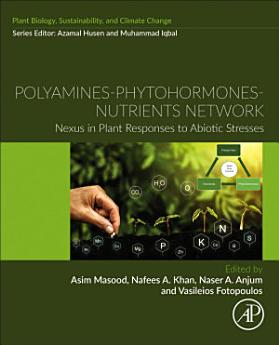Polyamines- Phytohormones- Nutrients Network: Nexus in Plant Responses to Abiotic Stresses
About this ebook
About the author
Dr. Masood, Assistant Professor of Botany at Aligarh Muslim University, is presently working on stress physiology of plants and its regulation through internal factors including phytohormones and nutrients. His main area of research is to analyse the stress-inducedresponses in plants to heavy-metal accumulation and toxicity, mineralnutrient availability in the soil and also the role of phytohormones inregulating the nutrient status of cells and their synergistic effect inalleviating heavy-metal toxicity. His main findings have been reported injournals of repute, including Plant, Cell & Environment, Journal ofExperimental Botany, Environmental and Experimental Botany,Photosynthetica, Plant Signalling and Behaviour, Journal of PlantPhysiology and others.
Prof. Nafees A. Khan research focuses on understanding the mechanisms of hormonal and nutritional regulation of plant growth with special emphasis on abiotic stress vis-a-vis photosynthetic efficiency and abiotic stress tolerance. He has received multiple recognitions of his work including recognition as a top scientist in a study conducted by Stanford University and published in Plos Journal He is highly cited and received a UGC Mid-Career Award in 2018.
Dr. Naser A. Anjum, Assistant Professor of Botany at Aligarh Muslim University, has made significant contributions to the biology of ‘Plant/Crop-Environment Adaptation’. His works have enlightened the physiology and biochemistry of plants/crops, and theiradaptation/tolerance to varied abiotic stress factors and pollutants. Hehas been the pioneer worker to unveil: nano-graphene mediatedoxidative stress, antioxidant metabolism and glutathione-redox system,and also glutathione-independent defense-system significance in foodcrop model. He has also contributed to the field of phytoremediation,and assessed plant/salt marsh macrophyte chemical pollutantsremediationpotential and the underlying physiological/(bio)chemicalmechanisms. Dr. Anjum received prestigious research awards fromPortuguese Foundation for Science and Technology (FCT) (Portugal),Academia Sinica (Taiwan), and the CSIR and DBT, Govt. of India. He is onthe Editorial boards of several journals. He is serving as the ManagingEditor of Plant Growth Regulation; and Associate Editor of InternationalJournal of Plant Biology, Frontiers in Agronomy, and Frontiers in MarineScience.
Dr. Vasileios Fotopoulos is Associate Professor inStructural and Functional Plant Biology and head of the CUT Plant StressPhysiology Group at Cyprus University of Technology. His main scientificresearch focuses on the study of nitro-oxidative signaling cascadesinvolved in the plant’s response to stress factors, with special emphasison the development of chemical, biological and nanotechnologicalpriming technologies ameliorating abiotic stress factors and promotingplant growth. In addition, he is studying plant secondary metabolismand antioxidant responses in fruit crops during ripening.







